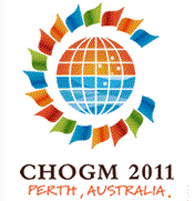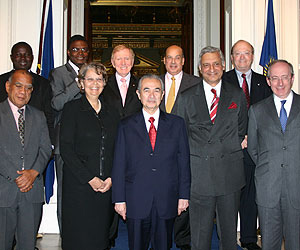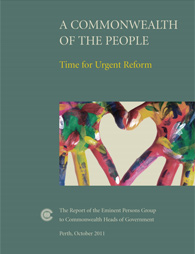British Commonwealth heads of government meeting in Perth in October did not adopt sweeping recommendations for change that included calling for the repeal of anti-homosexual criminal laws. We are not surprised. But the door has not been slammed shut. Doug Sanders reports.

At one point the British Empire ruled over one quarter of the world’s people and its Navy ruled the waves. It was the largest empire in world history. British ships transported three million African slaves to the Americas before 1850. In spite of that commercial success, Britain led the Western world in abolishing the slave trade and slavery.
A remarkable aspect of the Empire was its slow evolution to what we now know as the Commonwealth of Nations. The US, of course, revolted, leaving the family in 1776. No other colony left the family by way of revolution. Latin America is full of states that had wars of independence, and Asia has some too, notably Indonesia and Vietnam. None in Britain’s Asian colonies.
By 1931 the Empire was reorganised to recognise the factual independence that had gradually developed in countries like Canada, Australia and South Africa. In 1949 the present name “Commonwealth of Nations” was adopted. The Queen became the “head” of the Commonwealth, but it was decided that India could be a member, though it was a republic. The “Colombo Plan” was adopted, adding a development program to the body. Students from developing member states gained scholarships to study in richer member countries.
Post-war decolonisation, beginning with India in 1949, basically changed the organisation. It now has 54 members. The revolting US is not in. Nineteen are in Africa. Eleven are in Oceana. Ten are in the Caribbean. Eight are in Asia. Member countries have a total population of 2.2 billion. Of course, 1.21 billion are in India alone.
The Empire evolved first into a friendly club of the ‘white Dominions’ in 1931. It adopted a development focus after 1949. With decolonisation it became a predominantly third-world organisation. Could it become an advocate of human rights? It was deeply divided over sanctions against racist governments in Southern Rhodesia (now Zimbabwe) and South Africa. It has a history of censuring some countries for gross violations of human rights and democracy. It has suspended, at times, Fiji, Pakistan, Nigeria and Zimbabwe. It has broad policies on human rights and, in particular, against racism. But could it become a more active advocate of human rights?
In 1987 the Commonwealth Human Rights Initiative (HRI) was established, under the leadership of Flora MacDonald of Canada and Kamal Hossain of Bangladesh, both former cabinet ministers in their respective countries. It is an independent NGO, not an intergovernmental body. Its first publication “Put Our World to Rights”, edited by Flora MacDonald, set out a number of human rights challenges for the commonwealth. There was nothing on sexual orientation or gender identity issues, though Flora was fairly well known back home to be lesbian. 1987 was early in pushing human rights within the Commonwealth, and far too early to start raising sexuality issues. The HRI, based in New Delhi, continues its work with perhaps a hundred publications on human rights issues, most focused on India – none on SOGI issues.
The Commonwealth faced a problem of image and role. Could it, like the UN, like Europe, like the Organization of American States, gain legitimacy through the active promotion of human rights? Or was it just a pleasant talking shop of independent countries, increasingly irrelevant in international politics?

Photo: thecommonwealth.org
Members of the Commonwealth Eminent Persons Group
and Commonwealth Secretary-General
Kamalesh Sharma (front, second from right). The members
are Tun Abdullah Ahmad Badawi (Malaysia, Chairperson),
Ms Patricia Francis (Jamaica), Dr Asma Jahangir (Pakistan),
Mr Samuel Kavuma (Uganda) – (Commonwealth Youth Caucus),
The Hon Michael Kirby (Australia), Dr Graca Machel (Mozambique),
Rt Hon Sir Malcolm Rifkind (UK), Sir Ronald Sanders (Guyana),
Senator Hugh Segal (Canada) and Sir Ieremia Tabai (Kiribati)
The report by the Eminent Persons Group
A ten member ‘Eminent Persons Group’ was set up in 2009 to make recommendations to bring new life to the Commonwealth. The three Asian members of the EPG were Abdullah Ahmad Badawi, former Prime Minister of Malaysia (who had taken very progressive stands on women’s issues), Asma Jahangir of Pakistan (a well known progressive lawyer activist who has held various UN appointments), and everyone’s favorite gay judge, Michael Kirby of Australia. Kirby has just published an article “The Sodomy Offence: England’s Least Lovely Criminal Law Export?” in the Journal of Commonwealth Criminal law. Activist Peter Thatchell in the UK headed a campaign to have the Commonwealth officially condemn anti-homosexual criminal laws.

The EPG submitted its report to the biennial Commonwealth Heads of Government Meeting (CHOGM) in Perth, Australia, in October, 2011. The report stated that the Commonwealth had lost its relevance and was decaying due to the lack of a mechanism to censure member countries when they violated human rights or democratic norms. Previous decisions, such as those suspending Fiji, Nigeria, Pakistan and Zimbabwe, had been ad hoc decisions of politicians. This pattern needed to be replaced by an ongoing mechanism to police members. The EPG report had 106 “urgent” recommendations. The key recommendations were:
- Enact a charter for the Commonwealth, giving it structure.
- Establish a commissioner on the rule of law, democracy and human rights
- Repeal the laws against homosexual conduct in 41 of the member countries.
- Ban forced marriages.
Conservative Prime Minister David Cameron of Britain came out in favour of same-sex marriage in October at a Conservative party conference. His foreign minister’s speech at Perth included a call to repeal anti-homosexual criminal laws. The paradox, of course, is that the 41 member countries that have prohibitions had inherited them from Britain.
The Perth meeting adopted 30 of the report’s recommendations. It approved 12 more subject to considering their financial implications. It rejected 11 and sent 43 to a task force of ministers. They decided not to publish the Eminent Persons Group report (which was leaking out anyway). They also, it seems, have not published the exact recommendations adopted (30), rejected (11) and sent to a task force of ministers (43).
Former UK Foreign Secretary Sir Malcolm Rifkind, a member of the EPG, called the decision a “disgrace.” Many condemned the decision to hold back the EPG report. In a reversal, the report became public on the Commonwealth Secretariat website on October 30. It is likely that the recommendation on anti-homosexual laws is in the group of recommendations sent off to the task force of ministers. But no media reports seem to have seen the text of the actual CHOGM decision.
What is striking to this writer is that the only comment on the anti-homosexual criminal law recommendation that has appeared in public media was a simple statement by the representative of one African country that any decision on repeal would be up to the cabinet of his home government. Of course that is an evasive response. Better an evasion than a rejection.
This is the first time a CHOGM has dealt with the issue. Forty-one Commonwealth member states have anti-homosexual criminal laws – and that is a strong majority. They face an international situation where, for the first time, the UN has condemned anti-homosexual criminal laws (in the Human Rights Council and by the Secretary General and the High Commissioner for Human Rights). That means that it is not just a Western agenda. The issue will come back, it seems, at the next CHOGM to be held in Sri Lanka in 2013. Sri Lanka criminalises both male and female homosexual acts.
Doug Sanders is a retired Canadian law professor, living in Bangkok. He can be contacted at sanders_gwb@yahoo.ca.











 Printable Version
Printable Version












Reader's Comments
http://en.wikipedia.org/wiki/Slave_Trade_Act_1807
To be added... the felony part thus slavery becomes a crime punishable by law not just a decree on a piece of paper:
1811: Slave trading made a felony in the British Empire punishable by transportation for British subjects and foreigners (CAUGHT IN THE REALM OF THE BRITISH EMPIRE EITHER IN LAND OR AT SEA).
While now illegal everywhere, slavery or practices akin to it continue today in many countries throughout the world...If only South-East Asia's rampant de facto slavery...alas.
Please log in to use this feature.